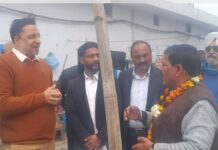Sikkim and Tripura Present Annual Action Plan For Giving Tap Water Connection To All Rural Households Under Jal Jeevan Mission
April 10th
States to engage civil society organizations/ Voluntary Organisations/ SHGs as Implementation Support Agencies to extend handholding support to the Gram Panchayats and local village community in programme implementation. With works to be implemented in all villages, skill training to be held for the local youth in plumbing, fitting, electrical works and masonry to create a cadre of trained manpower in villages, which will not only help in implementation of water supply infrastructure works, but also ensure regular operation and maintenance is being taken care of by local community. States need to launch IEC campaign about different aspects of water like water conservation, source strengthening, grey water management, water quality aspects and its link to individual health etc., so that Jal Jeevan Mission becomes a truly people’s movement.
It was highlighted that all drinking water sources need to be tested once for chemical parameters and twice for bacteriological contamination (pre and post monsoon) every year. Further, it was urged for training of at least 5 persons, preferably women, in every village for surveillance of water quality using field test kits (FTKs). Both the States were asked to complete NABL accreditation of all water quality laboratories in next few months. Union Government’s flagship programme, Jal Jeevan Mission (JJM) is under implementation in partnership with States since 15th August 2019. The objective of the Mission is universal coverage i.e., every family in the village gets tap water connection in their household. With focus on improving their living standard and enhancing their ‘ease of living’, the mission aims to ensure drinking water in adequate quantity, of prescribed quality and regular & long-term basis is provided to rural households through functional household tap connection. In 2021-22, Rs. 50,011 Crore budget allocation has been made for Jal Jeevan Mission. Further, there is also Rs. 26,940 Crore assured fund available under the 15th Finance Commission tied-grants to RLBs/ PRIs for water & sanitation, matching State share and externally aided projects. Thus, in 2021-22, more than Rs. 1 lakh Crore is planned to be invested on ensuring tap water supply to rural homes. With this enhanced budgetary allocation, States are likely to get almost 2.5 times of central funds in 2021-22 vis-à-vis 2020-21. This kind of huge investment in villages will give a boost to manufacturing activities, create employment opportunities in rural areas as well as boost to rural economy. Considering the prevailing Covid cases surge in the country, the National Jal Jeevan Mission is working continuously with States to ensure tap water connections provided to rural households, so that rural people, especially women and girls don’t have to go through the drudgery.

 हिंदी
हिंदी






